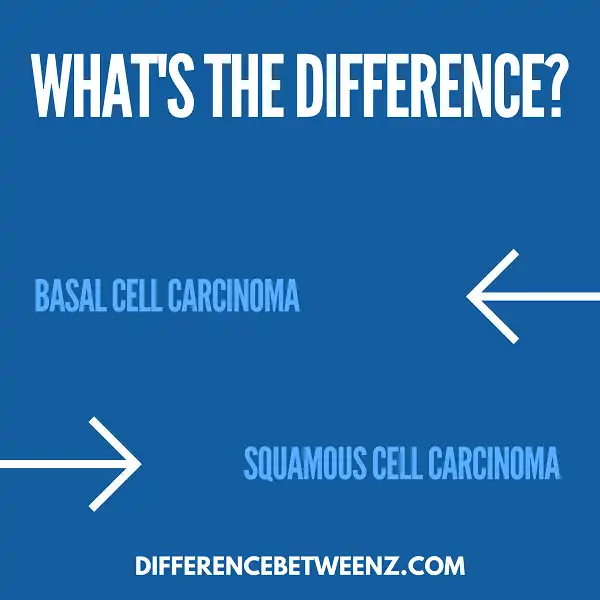If you or a loved one has been diagnosed with skin cancer, it is important to understand the two predominant types: basal cell carcinoma (BCC) and squamous cell carcinoma (SCC). BCC and SCC have different characteristics, treatments, and prognoses. To help give you a better understanding on which type of cancer your family member may be facing – we’ll dive deep into the world of skin cancers in this post. By exploring the more detailed information about BCC vs SCC, you can become an empowered partner during your medical conversations. So let’s start from square one – what are these potential forms of skin malignancy?
What is Basal Cell Carcinoma?
- Basal Cell Carcinoma (BCC) is the most common type of skin cancer, affecting over 4 million Americans each year. BCC can be identified as a flesh-colored or pearly bump on the skin and can become larger, more noticeable, and more painful if it is left untreated.
- Basal cell carcinoma often appears on parts of the body that are exposed to the sun such as the neck, face, ears, or scalp but can also develop in other areas of the body with minimal exposure. If detected early and treated, Basal Cell Carcinoma is usually curable and rarely leads to serious complications.
- The best way to protect yourself from Basal Cell Carcinoma is to use sunscreen regularly and limit direct exposure to the sun. In cases where Basal Cell Carcinoma has been diagnosed and treatment is necessary, there are several options such as topical creams or surgery that can help remove it from the body completely.
What is Squamous Cell Carcinoma?
Squamous Cell Carcinoma, or SCC for short, is a form of skin cancer and it can also occur in other parts of the body including the throat and lungs. Squamous Cell Carcinoma happens when abnormal squamous cells grow more rapidly than normal and are not replaced by healthy cells. Squamous Cell Carcinoma has several different causes, including exposure to ultraviolet radiation, certain kinds of infection, smoking, pollution, and genetic predisposition. It’s important to recognize any changes that could be Squamous Cell Carcinoma so definitely talk to a doctor if any new or unusual symptoms appear. Early diagnosis is key to successful treatment as Squamous Cell Carcinoma can lead to complications if left untreated.
Difference between Basal Cell and Squamous Cell Carcinoma
Basal cell and squamous cell carcinomas are two common types of skin cancer.
- Basal cell carcinoma is the most frequently diagnosed type, making up more than 80% of all skin cancer cases in the United States.
- Basal cells usually develop in areas exposed to strong ultraviolet radiation, such as sun-exposed parts of your body, like your face and neck.
- Basal cells form small lumps or patches which can be fleshy, flat, or scaly in appearance – they rarely spread further than the original area they were found on.
- On the other hand, Squamous Cell Carcinoma is less common (accounting for roughly 20% of skin cancers) but is often considered more serious.
- Squamous cells may be raised, red and scaly or flat and look like a hard ulcerated sore – they may also spread to other areas if left untreated.
Basal cell and squamous cell carcinomas are both serious forms of skin cancer that require a doctor’s opinion for proper treatment and prevention. It is important to note that both can be prevented through using sunscreen whenever you spend time out in the sun.
Conclusion
Basal cell carcinomas are the most common type of cancer. They are also the most treatable. If you have been diagnosed with basal cell carcinoma, your doctor will likely recommend surgery or radiation therapy to remove the tumors. Squamous cell carcinoma is a less common type of skin cancer, but it is more aggressive than basal cell carcinoma. Treatment for squamous cell carcinoma usually involves surgery to remove the tumor. If you have been diagnosed with squamous cell carcinoma, be sure to ask your doctor about all of your treatment options.


